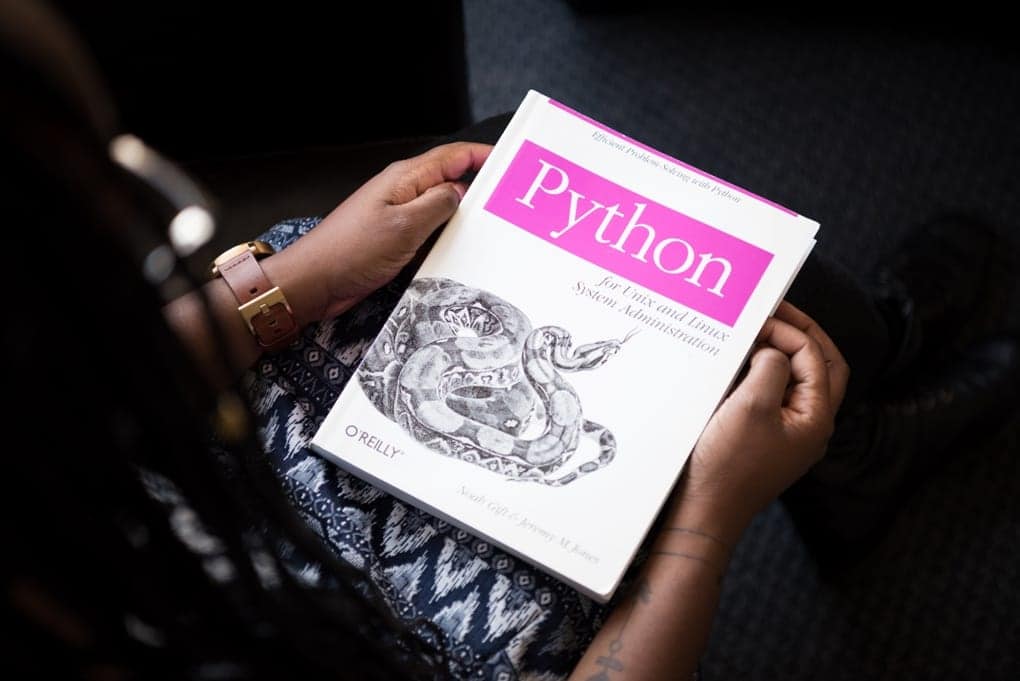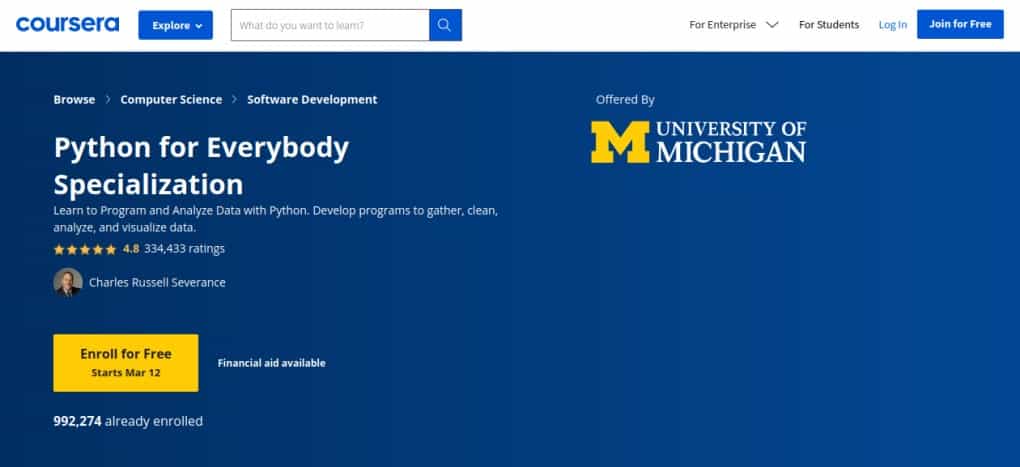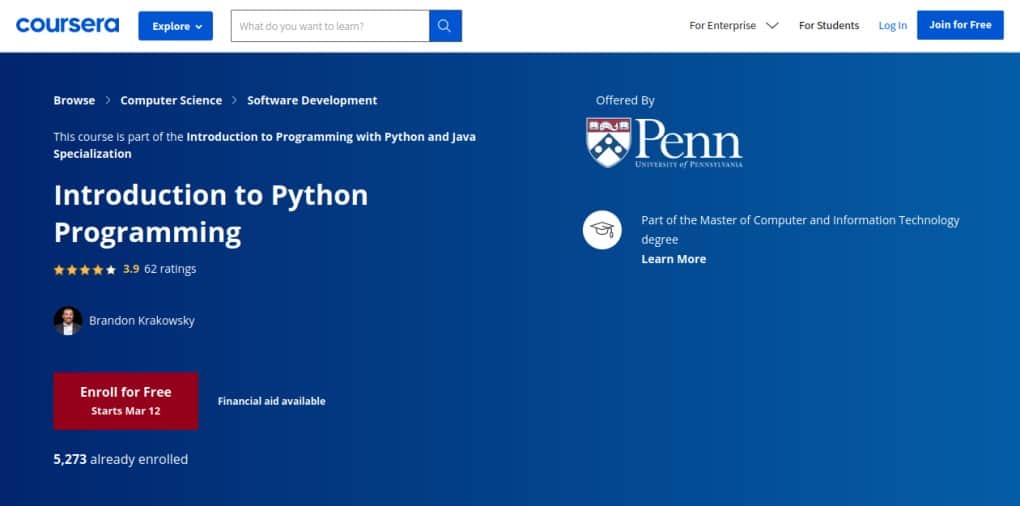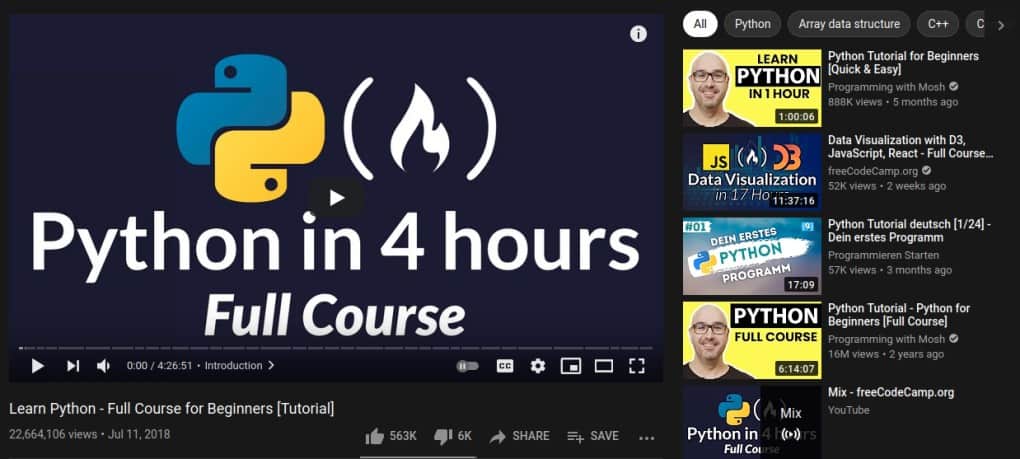
How to Learn Python: Top Learning Resources
Python is an incredibly flexible programming language. With knowledge of Python, you will be able to write systems scripts, develop games, build software, and more. Although Python may be a great language to learn, actually getting your head around the syntax of Python is a different matter in itself.
The best place to start your Python learning journey is with the right resources. That’s why we have written this guide. You will find some top books, courses, and tutorials for learning Python so that you can get started without having to worry about the quality of your study materials.
What is Python?
Python is a general-purpose programming language, meaning it can be used for a wide range of purposes. You will see Python used for building software, data analysis, creating games, and creating the back-end part of websites. Python is commonly used because it is powerful and its syntax is easy.
A lot of beginners say the Python syntax is readable. There are much fewer symbols and syntactic features that one needs to learn to use to get started with the programming language. And although the language is easy to read, that does not mean Python has compromised on the power of the language. Python is so powerful, in fact, that it is used by top companies around the world, from Google to NASA to CERN.
Why Should You Learn Python?
Python is a language favoured by beginners and expert developers alike. Why should you join the community of developers who have learned Python? Here are a few reasons:
- Python is flexible. Python can be used for a range of purposes. This means that once you know the basics of Python you can go on to build applications in a range of fields without having to learn a new programming language.
- Python has a big community. Python was the fourth “most popular language” in the 2020 Stack Overflow Developer Survey. Because the language is so popular, you should have no trouble finding documentation, tutorials, and other resources from which you can learn or find solutions to issues you are facing.
- Python is valued in the job market. There are 17,705 jobs on Glassdoor for Python developers as of March 9, 2020. This shows that Python skills are in demand. In addition, Python pays well. The average Python developer earns $76,526 per year according to Glassdoor, as of March 9, 2020.
Learning Python is a good way to get started with programming because the syntax is easy. By learning Python, you will have a skill that you can use for the rest of your career. The language has stood strong for decades and continues to be an incredibly popular choice among people who want to learn their first or a new programming language.
The Best Books for Learning Python
Books are a great way to learn about Python. You can follow along with the contents of a book at your own pace and there is no rush on finishing a book. Books usually have comprehensive descriptions of topics that you will not see in regular online articles, meaning you will be able to develop in-depth insights into what you are learning about.
Here are three top books for Python beginners.
‘Automate the Boring Stuff with Python’ by Al Sweigart
This book promises “practical programming for total beginners”. In Automate the Boring Stuff, you will learn the basics of writing Python programs with reference to real examples.
This book will teach you how to do things like search the web, format data in an Excel spreadsheet, and more. Each section walks you through concepts step-by-step rather than just telling you what to do so you can learn exactly how the code you are writing works.
’Think Python’ by Allen B. Downey
Think Python, which has been updated for Python 3, is a basic introduction to the Python programming language. You will learn all of the essential features of Python at the start of the book.
You will then learn more complex concepts like object-oriented programming later in the tutorial. This book comes with exercises as well as source code for those exercises to help you get started with the challenges in the book.
‘Learning Python: Powerful Object-Oriented Programming’ by Mark Lutz
This book introduces the Python programming language and teaches you how to write high-quality code. You will start by learning the basics of Python such as data types and variables. Later in the book, you will go on to discuss objects, classes, and how Python implements object-oriented programming principles.
This book features a range of quizzes designed to test your knowledge and exercises which force you to put your knowledge in practice.
The Best Courses for Learning Python
Courses are a popular choice among people who want to learn Python. Courses are great because they are visual. Instructors often use visual aids like code or diagrams to illustrate their points. This style of teaching can be easier to understand than just words like you would see in a book or an online tutorial.
Here are three top courses for learning the Python programming language.
Python for Everybody Specialization by University of Michigan

With no prior experience needed, this course is a great place to start learning the Python programming language. At the beginning of the course, you will learn basic syntax, mathematics, and data structures. You will then learn how to access web data and use databases.
This course ends with a capstone project where you will retrieve, process, and visualize data. This capstone will bring all of the skills you have learned in the course into one big project.
Introduction to Python Programming by University of Pennsylvania

In this short course, you will learn the syntax associated with Python and some of the basic features of the language that you should learn. This course takes about 25 hours to complete and is split up into four weeks of work. You will cover topics like essential data types, writing a basic Python program, and using dictionaries and files.
Learn Python – Full Course for Beginners [Tutorial] by freeCodeCamp

This freeCodeCamp video is a great way to learn the basics of Python. Most of what you need to know to write simple and slightly more advanced programs is taught in this course. You will start by writing a basic Python script and slowly work your way through various hands-on projects, each of which incorporating progressively more difficult topics.
The Best Tutorials for Learning Python
Written tutorials are a great way to learn a programming language like Python. Tutorials usually come with code snippets which you can copy-paste straight into your terminal to try out and manipulate. In addition, it is easy to look back at a part of a tutorial you have already read.
Here are a few tutorials which we recommend for Python beginners.
Python Learning Guide by Kaggle
Kaggle’s range of courses includes a few tutorials on Python. These tutorials cover topics like using functions, referring to the Python documentation, and various Python data types. The tutorials on this site come with exercises to complete. Kaggle estimates their Python course will take seven hours to complete in total.
The Hitchhiker’s Guide to Python!
“The Hitchhiker’s Guide to Python!” is still in development. This website features tutorials on various Python topics, from setting up a development environment to learning Python code style conventions.
This website is a great source if you already feel comfortable writing some Python code and want to learn more about best practices and specific Python applications (like building GUIs or command-line applications). But, there are some tutorials written for beginners, too.
Real Python’s Learn Python Programming, By Example
Real Python publishes tutorials on a range of Python concepts, from the basics of Python all the way to web scraping. Real Python has three tracks for learners: a beginner, intermediate, and advanced track. You can follow these tracks if you want a guided learning path. Or you can look at individual tutorials on the site if you would prefer.
Many of Real Python’s tutorials are long but this is because they go into great detail. But each article usually comes with a table of contents to guide you to where you want to go in the article.
Conclusion
Learning Python will take time. There will be challenges along the way but with the right mix of determination, practice, and focus you will get to where you want to be.
Your Python skills can apply both professionally or for personal projects. You could use your Python skills to automate some personal tasks. Or you could pursue a job as a software engineer. The choice is yours!
Using the resources above, you should be able to get off to an excellent start in your learning. We encourage you to research a few resources we mentioned above in more depth and see which ones work best for you.

